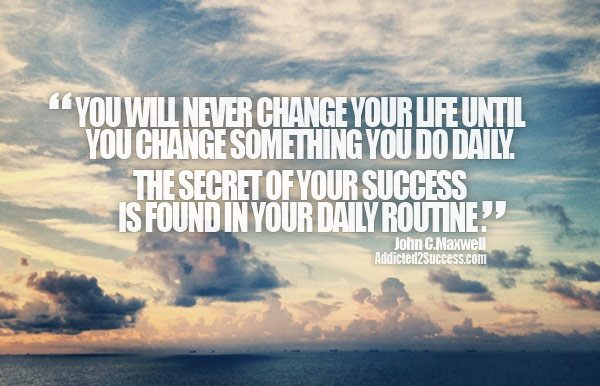Success Advice
7 Strategies That Can Propel Your Success To A New Level

A great Shakespeare play once said that successful people are either born that way, forced into their attainment, or work hard to quickly rise through the ranks.
The average person often thinks that to be successful, they have to spend as much time working as possible. However, this isn’t as true as you may think.
While this mentality may eventually pave the way to some short-term benefits, the greatest achievers in history often follow a different, almost counterintuitive path.
They know when it’s time to go after a goal, and when it’s time to sit back and enjoy their personal and often once in a lifetime events. Take a look at how some of these individuals, in pursuing the non-tangible benefits of life, achieved their prosperity.
1. General habits
To be successful, you must identify the potential in every moment of the day. That doesn’t mean you should always be working — quite the contrary. It means knowing when to take breaks, during which you do something unrelated to work: stretching, molding clay, practicing conscious silence, or drinking water.
The small things we do for our health have as much cumulative impact as the big endeavors (like running or cleansing), and they help make these bigger things effective.
Cultivating small self-care habits amid your workday is just one piece of the success puzzle. Planning your day more efficiently is another. Take heed of the following overlooked time-saving measures at your fingertips:
- It helps to set aside one block of time for checking emails and social media. After that’s done, if you’re not waiting for any urgent news, turn off all your notifications and do not check any of them again until you have some extended free time.
- When someone asks you to take on a project or invites you to an event, refuse to answer for sure until you’ve checked your schedule.
- While you’re parceling out your time, make a small note next to each task, indicating how long you think it will take to complete. Once it’s done, record how long it actually took. This begins to give you a feel for what you’re capable of, what your limits are, and where you need to grow.
No matter what your pursuit is at the moment, the key word is discipline. The discipline you develop will also help you build a strong brand through the consistency of your actions, which you’ll then be able to promote skillfully (again via your disciplined approach) and get people talking.
As another general rule, truly successful people realize that no amount of worldly triumph can replace their time with the individuals around them. Not only do they make room in their schedules for their friends and family, they also treat the people they meet in passing with importance, trying as often as they can to respond to the dignity of every human.
“We are what we repeatedly do. Excellence, then, is not an act, but a habit.”- Aristotle
2. Morning routines
Everyone knows to some degree that the way they spend their mornings will set the tone for the rest of the day, but highly successful people seem even more acutely aware of this. Their morning routines are intentional because they know there’s only so much time in the day, and they plan to enjoy and profit from all of it.
Beginning your day the night before is a great way to jumpstart your morning. Instead of playing games on your phone or bingeing on Netflix, decide on your goals for the next day. Even getting out some of the things you’ll need for your first objective is a good idea, so you’ll be ready to go as soon as you wake up.
Having a healthy breakfast planned can be a great morning motivator, too. Planning ahead can help you go to bed with a feeling of accomplishment already in place for tomorrow, which will help you sleep better.
Getting to bed at a reasonable time ushers in another benefit long associated with success: getting up with the sun (or even before). Even the biggest night owls can become morning people if they get in the habit of going to bed and getting up early. As far as what your morning actually consists of once you hit the floor, that’s up to your personal preference. The practices of some inspiring people in recent history may help you pick your own morning occupations.
3. Financial habits
To the successful, money is a thing to be used, not a goal in itself. If you purchase things just because you want them, but don’t put much thought into their long-term value, your bank account will never stay as full as you like it.
Similarly, if you value possessions over experiences, you’ll end up with a living space full of clutter that you once thought would impress your social competitors, when you could have spent that money on trips with your family or charitable causes that help those in poverty. Developing an eye for true value is one of the keys to success.
For example, the successful make saving a high priority. 10% of their income isn’t something they struggle to set aside; it’s often the bare minimum they save. Learning how to live on less creates excellent money habits, like keeping track of what you spend (as soon as you spend it, even if it’s an automatic bill payment) and staying out of debt. Just like you budget your time with a schedule, you have to budget your money if you aspire to move beyond paycheck-to-paycheck living.
“Motivation is what gets you started. Habit is what keeps you going.” – Jim Ryun
4. Weekend routines
The weekend is like those few minutes after you first wake up: often wasted, but bursting with underestimated opportunity. Assuming that you don’t already work weekends (in which case it would be an excellent idea to implement these strategies on at least one free day a week), here are some tips that Business Insider offers to make your days off all they can be:
- Be as diligent about scheduling your weekend time as you are about your workdays. That doesn’t mean you have to be your own slave driver; but it’s highly possible that the lack of a plan will tempt you to roll around in bed for a few extra hours. Create a loose structure for your weekend that gives you some big tasks or events to look forward to, and leaves room for you to fill in with small necessities or quiet time with family.
- Don’t just drift into your favorite lazy activities (scrolling Buzzfeed and watching Facebook arguments unfold); be intentional about both your productive and your leisure time.
- Just as during the week, take full advantage of the morning hours, when most of your house and neighborhood probably aren’t stirring yet.
- Turn off your devices as often as you can. Keeping track of your to-dos on actual paper is better for your brain anyway, as it triggers your muscle memory and strengthens your recall. Plus, it gives you more time to spend with others and make them feel like valuable parts of your life, rather than afterthoughts.
- Be proactive about Sunday night, whether you use it to plan for the week or do a fun activity. Both of these things will keep you from overthinking the nonessentials of your work the next morning.
The mindset that your weekend was a waste if you didn’t spend at least part of it working will only destroy your health and happiness, and quite possibly your relationships too. Workaholism is one of the fastest killers of whatever love you have for your job. If you don’t love it, you certainly won’t be good at it.
5. Self-education strategies
Many successful people have taken a page from the Lowe’s motto: “Never stop improving.” The end of formal school didn’t mean the end of learning for them. Famous autodidacts like da Vinci, H. P. Lovecraft, Hemingway, David Bowie, the Wright brothers, Steve Irwin, Michael Faraday, and Frederick Douglass let their curiosity propel them to become better than average.
Using free time to read books is still one of the best brain-building exercises, and it will do worlds more for you than any kind of electronic distraction. Numerous articles indicate that the best minds in business prefer self-improvement and financial books, as well as some classics for entertainment.
Emphasizing the power of books doesn’t necessarily mean writing technology off as evil. There’s an impressive array of websites dedicated to enlarging your mental capacity and teaching you new skills, and many of them are free! They’re great to visit during your breaks or other allotted free time.

6. Preventive maintenance for burnout
Even the most well-regulated mind can immerse itself too deeply in its work, only to discover with shock that its former passion isn’t even fun anymore. Don’t get so enthusiastic about your new game plan that you forget to take care of your mental needs.
No matter how tempting it is to start cutting your downtime short because you really enjoy the work you’re doing, do not do this. Skipping the first break is like allowing yourself the first bite of forbidden fruit: you get so comfortable doing it that you eventually can’t stop. Remind yourself that no amount of excitement you get from a project is worth your health, and you’ll only stay good at what you’re doing if you step away from it frequently. Try a new routine if you necessary.
If you feel burnout setting in, take this advice from other prosperous professionals on how to combat it:
- Being humble enough to ask for help. This can chafe if you’re used to getting everything done alone, but it is possible that you’ll learn a better way to do things.
- Not overestimating your abilities, a common mistake made by young professionals.
- Working in a different environment. This always works well to break up the routine and keep your job from becoming repetitive and dull.
- Incorporating physical movement into your day whenever possible, such as walking around the office or doing exercises near your desk.
If you’ve always been an overachiever, stop driving yourself to make everything “perfect.” That cycle will only erode your sanity. After all, you’ll always find flaws if you stare at something long enough. Learn to look at your work and be satisfied that it is adequate, instead of wearing yourself out.
7. Winding down
As we mentioned in the morning section, a great day begins with a great morning. A great morning begins with a great night of sleep. A great night of sleep only happens when you’re intentional about winding down, instead of working yourself up with all the little things you HAVE to finish tonight.
It’s wise to keep all electronics as far from your sleeping space as you can. If you give in to the temptation to check your phone “one last time,” the blue-toned light that your screen subtly emits will only make you more alert. Instead, keep a notepad or journal handy so you can write down last-minute ideas that occur to you and reflect on the good that you did that day (à la Benjamin Franklin). Save your big decisions and brainstorming for tomorrow.
Investing in a good mattress will go a long way toward proper sleep habits. If your muscles can’t relax, you’ll wake up tired no matter how many hours you got. Going to bed at a set time is another hard, but necessary component of a disciplined life. A lower temperature in your bedroom and a few moments of meditation on your upcoming goals will help you drop off more quickly, too.
Lastly, as some encouragement, don’t be afraid to hope that you’re on your way to success. Those who know you best will be able to tell when you’ve gotten things in order and are making progress toward a fuller life.
Whatever else you may do, don’t give up, and you’ll get there!
Business
Why Smart Entrepreneurs Are Quietly Buying Gold and Silver
When stocks, property, and cash move together, smart business owners turn to one asset that plays by different rules.

You’ve built your business from the ground up. You know what it takes to create value, manage risk, and grow wealth. But here’s something that might surprise you: some of the most successful entrepreneurs are quietly adding physical gold and silver to their portfolios. (more…)
Business
The Simple Security Stack Every Online Business Needs
Most small businesses are exposed online without realising it. This simple protection stack keeps costs low and risks lower.

Running a business online brings speed and reach, but it also brings risk. Data moves fast. Payments travel across borders. Teams log in from homes, cafés, and airports. (more…)
Business
If Your Business Internet Keeps Letting You Down, Read This
From smoother operations to better security, dedicated internet access is quietly powering today’s high-performing businesses.

Today, a dependable internet service is the bedrock for uninterrupted business operations. Many organizations rely on stable online connections for communication, data transfer, and customer interaction. (more…)
Did You Know
How Skilled Migrants Are Building Successful Careers After Moving Countries
Behind every successful skilled migrant career is a mix of resilience, strategy, and navigating systems built for locals.

Moving to a new country for work is exciting, but it can also be unnerving. Skilled migrants leave behind familiar systems, networks, and support to pursue better job opportunities and a better future for their families. (more…)
-

 News3 weeks ago
News3 weeks agoBrandon Willington Builds 7-Figure Business by Ignoring Almost Everything
-

 Health & Fitness3 weeks ago
Health & Fitness3 weeks agoWhat Minimalism Actually Means for Your Wellness Choices
-

 Did You Know3 weeks ago
Did You Know3 weeks agoWhy Most Online Courses Fail and How to Fix Them
-

 Business3 weeks ago
Business3 weeks agoIf Your Business Internet Keeps Letting You Down, Read This
-

 Business2 weeks ago
Business2 weeks agoEntrepreneur’s Guide to Pay Stubs: Why Freelancers and Small Business Owners Need a Smart Generator
-

 Business1 week ago
Business1 week agoThe Salary Shift Giving UK Employers An Unexpected Edge
-

 Business1 week ago
Business1 week agoThe Simple Security Stack Every Online Business Needs
-

 Scale Your Business1 week ago
Scale Your Business1 week ago5 Real Ways to Grow Your User Base Fast






























3 Comments